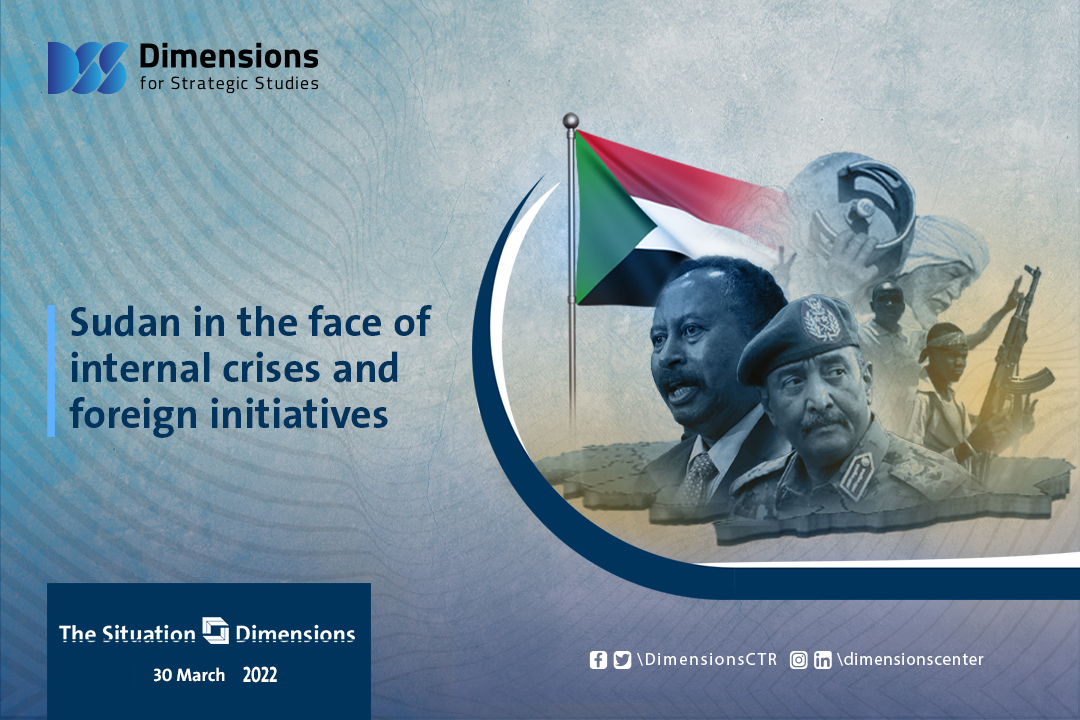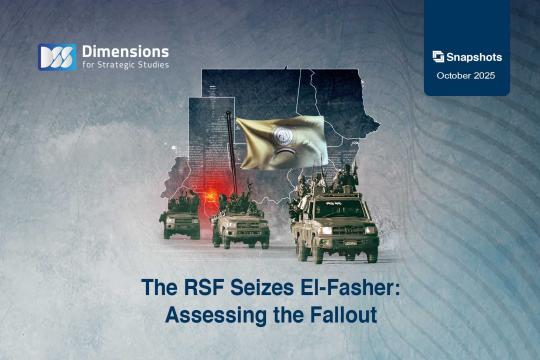
Sudan in the face of internal crises and foreign initiatives
2022-03-301964 view
Many Sudanese cities - especially the capital Khartoum - are witnessing an escalation by the opposition "Resistance Committees". This escalation came in a shape of blocking the main and side streets and calls for millions of people to take to streets in demonstrations. Such protests, as the campaigners say, are to take place according to a previously announced schedule, claiming to protest against the procedures made by Gen. Abdel Fattah al-Burhan in last October, which the resistance committees describe as a coup attempt. Also, the committees call for protests to restore legitimacy and to move the process of democracy forward.
The project of the "resistance committees" of struggling against the military council is supported by the U.N. Integrated Transition Assistance Mission in Sudan (UNITAMS), the African Union (AU) and the Western countries' embassies in Khartoum.
This escalation, over the past three weeks, has further aggravated the political crisis in the Sudan. It has been also accompanied by a severe economic crisis.
After the Sudan has been overloaded with internal and external initiatives that failed to reach a political solution or formula that expresses the concerns of the Sudanese political forces or the players and those interested in Sudan from abroad, the political scene is stuck in a difficult deadlock and paralysis as the country seems to have no guiding work dynamics.
In general, this is the situation that precedes the outbreak of military coups, which is the stigma attached to the history of Sudanese political life. Yet, a lesson as such has not recognized by the political elite, which is represented by the "modern forces", let alone the traditional political forces.
This escalation by the opposition comes in line with high expectations among elites headquarters, and even within the military establishment, that a "coup" is highly likely to occur. Although the coup in this context often refers to the inevitability of "change", a complete military coup is, however, highly unlikely; because the cadres of the Communist Party or the Arab Socialist Baath Party - which lead the radical opposition movement - are limited within the army. Some senior leaders and some middle-level officers within the army do not tend to weaken the military institution, after the opposition movement contributed during the past periods to delivering a message to the entire military institution sayying that this establishment's roles, position and privileges have being targeted.
Examining the available data shows that there are two possible tracks for developments in the Sudan today:
The first track: Efforts made by the "Resistance Committees" to pressure the others started to bear fruit. It was approved and then imposed on the country. The Resistance Committees as a civil front for the Communist Party have other similar fronts that work under the title of "civil society organizations". They include various civil entities and associations, in addition to the so-called "stakeholders" who adopt the "New Sudan" project, which aligns with the neo-liberal trends of the Western project proposed for Sudan. It is a project politically controlled by the Western countries through the United Nations Mission (UNITAMS), whereas socially, it brought about some changes in the social system that prevailed in Sudan. The incubator for this project will be some left-wing parties and part of the wings of the traditional sectarian parties.
The economic arm of the aforementioned project is manifested by applying the World Bank's package of policies; especially since the past period has positive signs showing that the painful effects of these policies that have been applied are not met with resistance from the Sudanese people. That will definitely motivate the government to take more economic liberalization policies and use a floating exchange rate regime for the Sudanese local currency.
This scenario is challenged with not only the inability of the Forces of Freedom and Change (FFC) to take the lead again, but also the ineffectiveness of the slogan of "returning to the democratic path" at the popular level.
The second track: General Al-Burhan to move forward with the procedures he has adopted, that's to work on restructuring the armed forces and all security agencies, in balance with the formation of a national government, and looking for a political incubator for it.
Perhaps the emergence of the name of Dr. Al-Tijani Al-Sisi, as a candidate for prime minister, comes within the framework of feeling the pulse and just a trial balloon for preparing the public opinion for a scenario as such, so that its political incubator is the Freedom and Change-the Founding Platform (FFC-FP)".
This scenario will be supported by some countries in the region, such as Egypt and Saudi Arabia, which will work on promoting it in the West.
This scenario faces the problem of the relationship between Al-Burhan and Hemedti, as their relationship experiences a clash that develops to a point where it may not be possible for them to continue together. Therefore, it might be necessary to have one of them neutralised, so that the Military Council can continue to take the lead.





